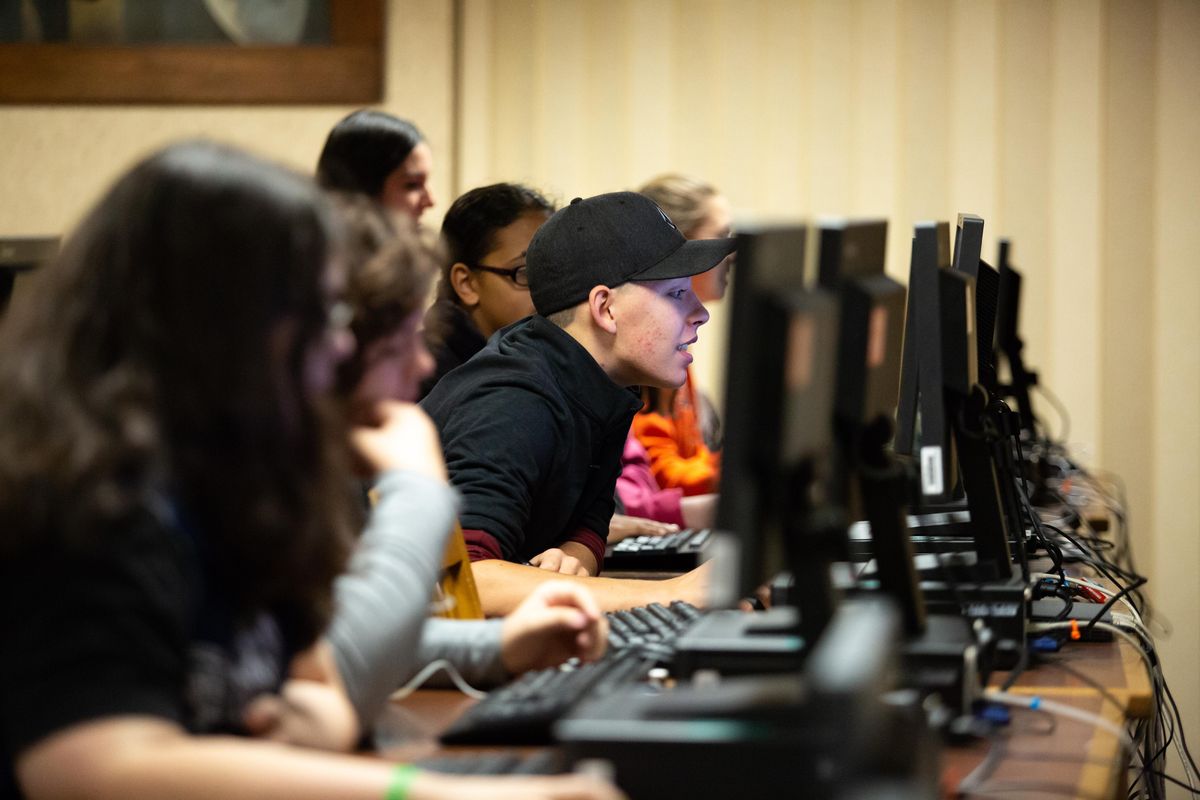Early morning ‘zero hour’ classes give ambitious teens a boost, but is it costing them sleep?

Since when did sleep become an elective for high school students?
Every school day at 7 a.m., Sue Rieger sits in the library at Lewis and Clark High School, her eyes fixed on a computer screen and her fingers typing furiously, thanks in part to the Red Bull-infused concoction on her desk.
She wasn’t alone. Displaying various states of coherence, Rieger’s classmates filled the seats in Natasha Carpenter’s speech and debate class.
Welcome to zero hour, a fixture in American schools for more than two decades. And with the school day bracketed by bus timetables and after-school activities, it’s probably here to stay.
For the ambitious and the passionate, zero hour is a reward in itself.
“I love debate,” Rieger said.
Better yet, down the road, that extra class might just tip the scales toward admission to a better college.
The price is a good night’s sleep. Combined with an overstuffed schedule, that can lead to what LC principal Marybeth Smith calls “crackling,” or the warning signs of a full-blown crackup.
According to Smith, those might include dependence on caffeine, social withdrawal and “numbing out” on social media.
“Are they connecting with their families on occasion, and going to church and the other things that families do together?” Smith asked.
Lack of sleep is a big deal, some experts believe. According to the American Academy of Sleep Medicine, teens require eight to 10 hours of sleep, preferably ending after 7 a.m.
Instead, zero-hour classes run so contrary to some teens’ sleep rhythms, it’s akin to asking an adult to rise and shine at 4 a.m.
The early classes are designed to give students taking a full-load of college preparatory classes, which includes two years of a foreign language, an extra period. This allows students to stick with a favorite elective during regular hours such as band or orchestra.
Some students have responded to the sleep concerns with a wink and a few nod-offs.
On the skywalk connecting LC’s field house with the main building, a poster reminds students that they need nine hours of sleep a night.
While most teenagers’ biggest debate is whether to push the snooze button just one more time, Rieger and her classmates are prepping for real debates.
“I’m very competitive, I’ve always had that edge,” said Rieger, who qualified for nationals two straight years. “I really do like seeing immediate gratification. When I don’t prepare well, I see the difference between first and third place.”
On top of debate, Rieger juggles a full course load, a night job at Tomato Street and plenty of extracurriculars. She averages six hours of sleep on school nights and catches up on sleep during weekends.
She’s not alone. Across Spokane, hundreds of students are taking zero-hour classes in photography, stagecraft, debate, jazz, marching band and even honors biology.
In a perfect world, they would be offered long after sunrise. But there aren’t enough hours in the standard six-period day, which also includes advanced placement classes.
“The AP kids wanted to take this (speech and debate) class, but the only time was zero hour,” said Carpenter, a teacher at LC for 14 years, including five at zero hour.
“These kids are driven,” she said. “The drive for this was to make the debate team more competitive.”
“They have to show that they’re tournament ready,” Carpenter said.
However, Carpenter urges parents to monitor their children’s’ behavior. “Are they getting their homework done, are they getting at least seven hours of sleep?”
In a study released in 2015, researchers from Oxford University, Harvard University, and the University of Nevada concluded that “the impact of early school times on adolescents is not understood by most educators: A common belief is that adolescents are tired, irritable, and uncooperative because they choose to stay up too late, or are difficult to wake in the morning because they are lazy.”
Other research shows that teens’ ability to make responsible decisions, like going to bed on time, is still developing during adolescence.
The use of “blue light” devices such as tablets and smartphones close to bedtime can affect the quality of their sleep.
At the same time, researchers acknowledged that schools were unlikely to follow their guidance, in part because of logistical issues.
Like most districts, Spokane Public Schools runs buses in sequence, delivering high schoolers to class by 8 a.m. Elementary and middle schoolers follow. A later start time would push everyone back, which isn’t tenable.
Moving zero-hour classes to the end of the day also wouldn’t work because extracurriculars begin immediately after class, at 2:30 p.m.
“I have to take this class now because I play softball,” said Chloe Olson, a junior.
Spokane schools understand the problem. Five years ago, the district swapped start times for elementary and middle school, pushing the latter back to 9 a.m.
Also, the Spokane Virtual Learning program has expanded, lessening the reliance on zero-hour classes.
“We’re continuing to expand those options,” said Adam Swinyard, the district’s chief academic officer.
For now, the best option for zero-hour students is a little self-discipline.
Even at 7 a.m., senior speech student Skye Cordero was full of energy.
“I don’t drink energy drinks,” said Cordero, who also takes three advanced placement classes.
“But I try to get to sleep by 9,” Cordero said.